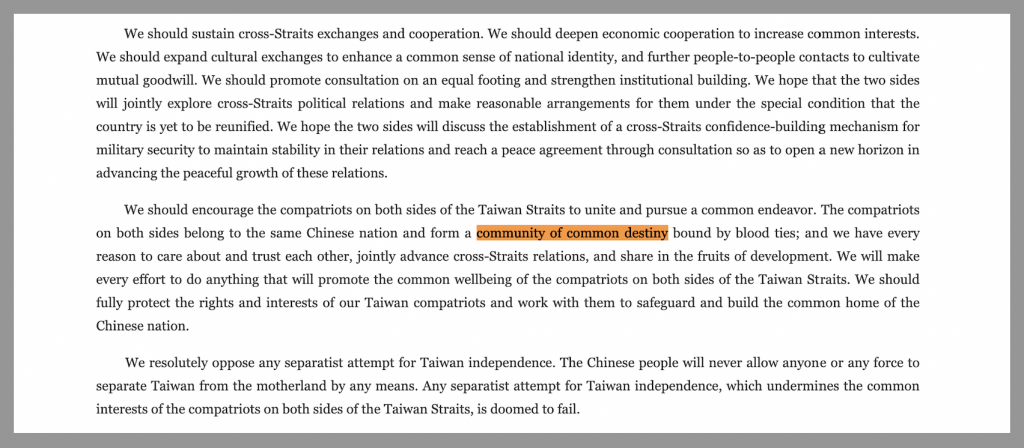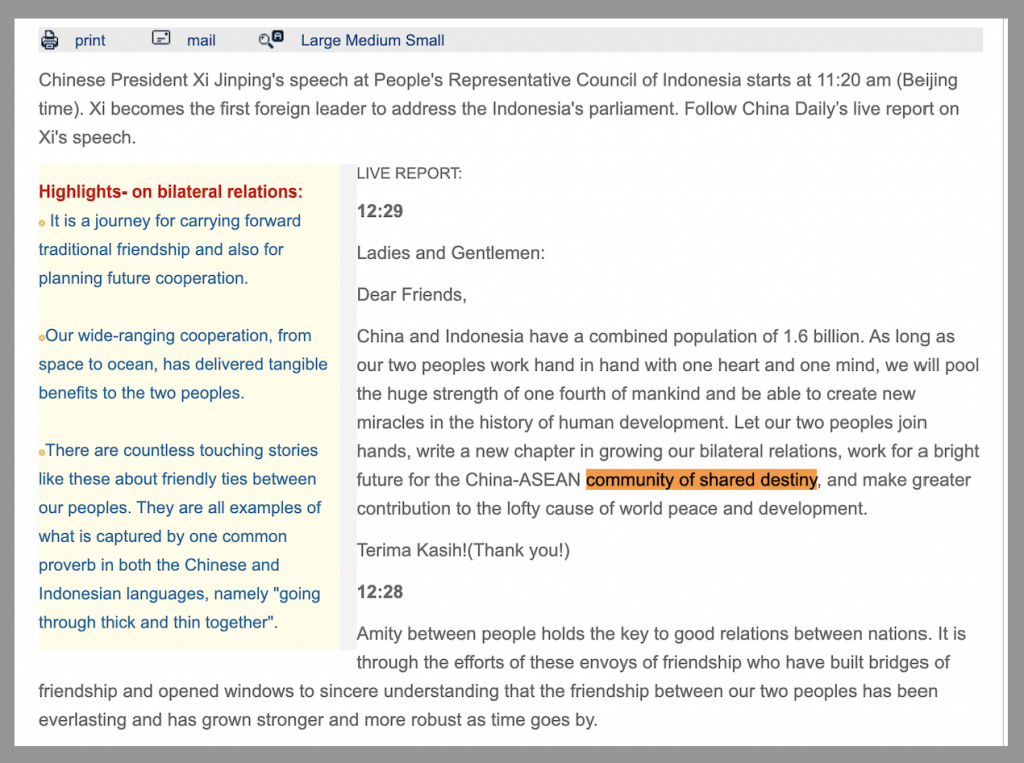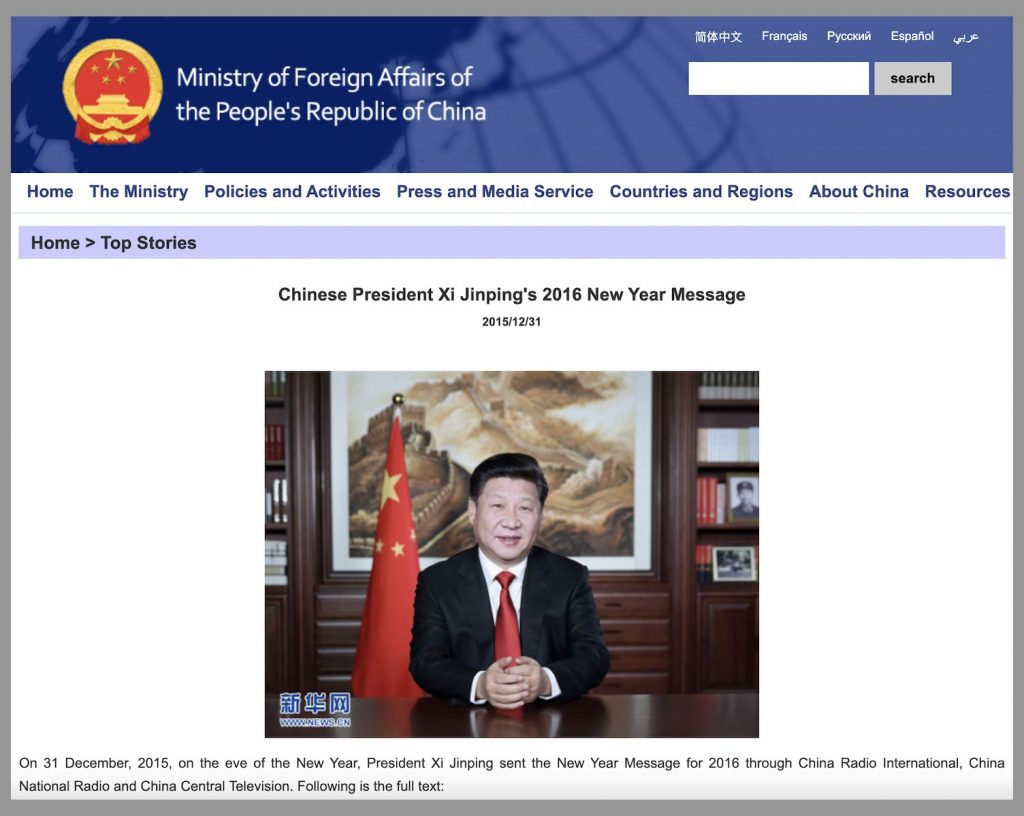THE CMP DICTIONARY
Community of Common Destiny for Mankind
Community of Common Destiny for Mankind
Secretary of Defense James N. Mattis meets with President of China Xi Jinping at Diaoyutai State Guest House in Beijing, China, June 27, 2018. Image by US Secretary of Defense available at Flickr.com under CC license.
The phrase “community of common destiny for mankind” (人类命运共同体) first entered the official discourse of the Chinese Communist Party on November 8, 2012, included in Hu Jintao’s political report to the 18th National Congress of the CCP. The phrase “community of common destiny” (minus “mankind”) first appeared in Hu’s political report in a section dealing with the Taiwan question, but within days of the National Congress it was clear already that the phrase was intended to have broader relevance to global affairs, pointing to the need for interconnectedness and mutual development among nations, and for “cooperative security” and “common security” and so on. The exact language in Hu’s report was:
In promoting mutually beneficial cooperation, we should raise awareness about human beings sharing a community of common destiny. A country should accommodate the legitimate concerns of others when pursuing its own interests; and it should promote common development of all countries when advancing its own development. Countries should establish a new type of global development partnership that is more equitable and balanced, stick together in times of difficulty, both share rights and shoulder obligations, and boost the common interests of mankind.
合作共赢,就是要倡导人类命运共同体意识,在追求本国利益时兼顾他国合理关切,在谋求本国发展中促进各国共同发展,建立更加平等均衡的新型全球发展伙伴关系,同舟共济,权责共担,增进人类共同利益。
The above English-language translation is that offered at the time of the 18th National Congress by China’s government, and published by the Ministry of Foreign Affairs (MOFA) through the websites of various foreign embassies.

In a speech delivered to the Moscow State Institute of International Relations in March 2013, Xi Jinping said, according to an official English translation provided by MOFA: “It is a world where countries are linked with and dependent on one another at a level never seen before. Mankind, by living in the same global village within the same time and space where history and reality meet, have increasingly emerged as a community of common destiny in which everyone has in himself a little bit of others.”
Through 2013, the phrase “community of common destiny” developed beyond this notion of interconnectedness to encompass the idea that a China more active in global affairs as it sought to realize the “Chinese dream” of what Xi referred to as the “great rejuvenation” (essentially, China’s return to the center of world civilization), could benefit the prosperity and well-being of populations around the world, and promote the “reforming and developing [of] the global governance system.”
At a conference on diplomacy with neighboring countries in October 2013, Xi Jinping again spoke of a “community of common destiny,” telling his audience that “the basic principle of diplomacy with neighbors is to treat them as friends and partners, to make them feel safe and to help them develop.” Xi said:
We should properly introduce China’s domestic and foreign policies to the outside world, clearly tell China’s story, spread China’s voice, and integrate the Chinese dream with the desire of the people of the neighboring countries for a good life, and with the prospects for regional development, letting the awareness of community of common destiny take root in the neighboring countries.
The translation “community of shared destiny” was also used in the official translation of a speech Xi made in October 2013 to Indonesia’s parliament.

By the second half of 2015, the English translation of 命运 as “destiny” was dropped in favor of “future,” as China apparently came to realize that the notion of “destiny” could raise anxieties among some international audiences owing to its sense of inevitability, and prompt criticism that China’s foreign policy was expansive beneath the talk of co-prosperity. When Xi Jinping gave a speech to the United Nations in New York on September 28, 2015, the Chinese phrase 人类命运共同体 was rendered as “community of shared future for mankind.”
The same translation was used by MOFA in its translation on December 31, 2015, of Xi Jinping’s “New Year Message,” in which the final line read: “I sincerely hope that the international community will work together to promote peace and cooperation, turn confrontation into cooperation and turn swords into ploughshares. Let all of us endeavor to build a community of common future for mankind shared by people of all countries.”

As a translation, “community of common destiny for mankind” is arguably favorable, despite the change in China’s official rendering, as “future” is a poor translation of the Chinese word 命运, and as the original Chinese phrase remains unchanged.
“Community of common destiny for mankind,” or renlei mingyun gongtongti (人类命运共同体), is now central to the notion of “Xi Jinping Thought on Diplomacy” (习近平外交思想), the phrase encompassing Chinese foreign policy in the so-called “New Era.” Xi Jinping used the phrase in his speech to mark the opening of Belt and Road forum in 2017, and in 2018 the concept was added to the Constitution of the People’s Republic of China, as a core value driving the CCP’s international relations, coming ahead of language affirming China’s opposition to imperialism, hegemonism and colonialism, and its commitment to unity among the peoples of the world.
While the term seems to appeal to a set of shared values and goals as the core of international relations – and resembles, for example, ideas at the heart of the formation of the European Union – it is important to note that the phrase incorporates traditional elements of Chinese foreign policy that prioritize a state-centered approach to human rights, while subordinating individual rights to the basic question of national interest.
Promoting a nation-centered view of international governance, human rights and development serves China’s longer term interests by legitimizing its domestic approach to governance and its domestic rights situation even as it expands its economic and political reach across the globe. In this respect, Xi Jinping’s “community of common destiny for mankind” can be viewed as a reconfiguring of Chinese foreign policy — based on foundational ideas of national sovereignty, territorial integrity and non-interference — within the liberal “common destiny” vocabulary of common development and transnational peace.
In the Chinese political discourse, Xi’s “community of common destiny for mankind” has been characterized as offering “a Chinese Solution and Chinese wisdom to the reform and innovation of global human rights governance.” The innovation lies in relegating all questions of individual rights to matters of peace and security, development, national sovereignty and state-to-state equality.
In the midst of the Covid-19 pandemic, China further emphasized the importance of building a “community of common destiny for mankind,” linking the concept to the advancement of global health goals. It even advanced the idea of a “health and wellness community for mankind” (人类卫生健康共同体). According to the official CCP journal Seeking Truth (求是), China has applied the principle of a “community of common destiny” in rendering assistance to the world during the pandemic, providing aid such as protective masks, medical gear and testing kits to more than 150 countries.
In some cases, China has also sought to contrast the supposed cooperative spirit of the concept of a “community of common destiny for mankind” with what it deems the selfish and narrowly political conduct of other countries, notably the United States. In December 2020, for example, an article by China News Service, an official newswire, condemned the US for its domestic failures in handling Covid-19, and for accusations leveled at China, including the suggestion that the virus was leaked from a lab in Wuhan.
While China has insisted that the notion of a “community of common destiny of mankind” has been broadly accepted by the global community, the phrase has met with some resistance from other countries. In June 2020, as a document was drafted at the United Nations to commemorate its 75th anniversary, India joined five Western countries in protesting the inclusion of the phrase “shared vision for a common future” in the draft, available here, on the grounds that it reflected Chinese political phraseology.

Stella Chen
The CMP Dictionary
C
D
F
G
M
N
P
S
- Scaling the Wall
- Science
- Second-Generation Reds
- Security
- Seeking Progress in Stability
- Seeking Truth From Facts
- Self-Revolution
- Seven Bottom Lines
- Six Adheres
- Smart Governance
- Sneaky Visit
- So-Called
- Socialite
- Soft Resistance
- Soul and Root
- Soundless Saturation / Quietly Nourishing
- Sovereignty
- Speaking Politics
- Streamlining Services
- Strong Cyber Power